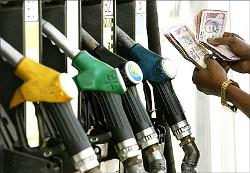
Petrol prices were freed from government control last month, resulting in a Rs 3.50 per litre rate hike in Delhi.
However, the modalities of subsequent retail price adjustments -- in line with changes in raw material cost -- were left for the industry to decide.
Though diesel prices were raised by an ad-hoc Rs 2 per litre, it continues to be under government control.
"It makes no sense for PSUs to compete among themselves if only petrol prices are being freed. Oil marketing companies (or state-run fuel retailers) will continue to coordinate on the pricing of petrol," said a top oil PSU executive. Indian Oil Corporation, Bharat Petroleum Corporation and Hindustan Petroleum Corporation are likely to revise petrol prices twice a month on the basis of fortnightly average of crude oil prices.
Stating that the modalities are likely to be finalised this week, he said that pump rates may be revised at least once this month.
The three companies would have a uniform rate for petrol in particular cities or locations, and it would change on the same dates.
"We will not announce dates of revision in advance to avoid hoarding of the fuel. Instead of changes in rates on the 1st and 16th of every month, we will revise prices on any day of the month," he said.
"For example, prices can be revised on the 29th or 2nd of the month, instead of the usual practice of revising on the 1st. Similarly, rates may change on 14th or 17th instead of the 16th," the executive added.
Oil Secretary S Sundareshan said the change needed in the retail selling price of petrol will be known on July 15 (based on the average cost of oil in the first fortnight), and the modalities would flow thereof.
"OMCs have been consulting among themselves (on the modalities), and now, discussions would be held at the ministry level. Very shortly, modalities like frequency of price changes will be announced," he said.
Sources said the three PSUs have already held discussions with private retailers -- Reliance Industries, Essar Oil and Royal Dutch/Shell -- on modalities such as frequency and intervals at which prices would be revised.
Initially, the oil ministry was not in favour of fortnightly revisions and the same line was adopted by market leader IOC.
However, most of the other retailers favoured fortnightly revisions in retail rates to reflect changes in cost of raw material (crude oil).
Those in favour of a 15-day cycle for price adjustment argue that oil firms already have a mechanism of calculating the desired fuel prices on the 1st and 16th of every month, and the same just needs to be passed on to the consumers now.
Also, rates of aviation turbine fuel, which was freed from government control in 2002, change with cost every fortnight.
The Bharatiya Janata Party-led National Democratic Alliance government had decontrolled petrol and diesel prices on April 1, 2002, and they were being revised every fortnight for nearly 21 months.
The practice was stopped a few months before the general elections in May 2004, and the controls were back in place when the then United Progressive Alliance came to power. An empowered group of minister, headed by Finance Minister Pranab Mukherjee, decided to free petrol and diesel prices from government control on June 25.
While petrol was decontrolled with immediate effect, diesel was put on hold for the time being.
Freeing of petrol price resulted in a Rs 3.50 per litre hike in petrol prices while diesel rates were raised by an ad-hoc Rs 2 per litre, instead of the Rs 3.80 per litre increase required to align them with the international market.
Also, domestic liquefied petroleum gas prices were increased by Rs 35 per 14.2-kg cylinder.
Kerosene rates were hiked by Rs 3 per litre to cut the government's fuel subsidy.